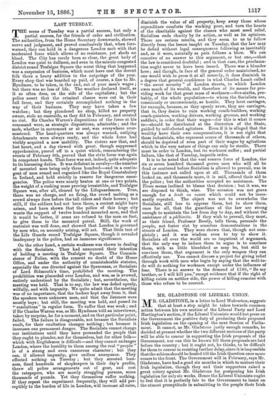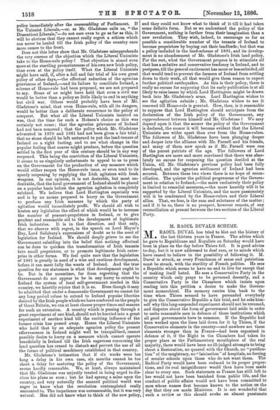MR. GLADSTONE ON LIBERAL UNION.
MR. GLADSTONE, in a letter to Lord Wolverton, suggests that at least a step might be taken towards common action between his own section of the Liberal Party and Lord Flartington's section, if the Liberal Unionists would but press on the Government the positive duty of producing their proposed Irish legislation on the opening of the next Session of Parlia- ment. It cannot, as Mr. Gladstone justly enough remarks, be decided at present whether the two different sections of the party will be able to concur in supporting the Irish proposals of the Government, nor can this be known till those proposals are laid before the country ; but it ought not, he thinks, to be difficult for them to concur in resisting further delay, since it is impossible that the schism should be healed till the Irish Question once more comes to the front. The Government will in February, says Mr. Gladstone, have had a good six months in which to mature their Irish legislation, though they and their supporters raised a great outcry against Mr. Gladstone for postponing his Irish legislation for only six weeks. Hence the Liberal Unionists ought to feel that it is perfectly fair to the Government to insist on the utmost promptitude in submitting to the people their Irish
policy immediately after the reassembling of Parliament. If the Unionist Liberals,—or, as Mr. Gladstone calls us, "the Dissentient Liberals,"—do not care even to go as far as this, it will be obvious that they cannot really regret a schism which can never be healed till the Irish policy of the country once more comes to the front.
Does not this letter show that Mr. Gladstone misapprehends the very essence of the objection which the Liberal Unionists take to the Home-rule policy? That objection is aimed even more at the startling prematureness of his own new Irish policy, than even at the policy itself. What the Liberal Unionists might have said, if, after a full and fair trial of his own great policy of other days,—the effectual reduction of the agrarian grievances of Ireland,—and its failure to conciliate Ireland, a scheme of Home-rule had been proposed, we are not prepared to Bay. Some of us might have held that even a civil war would be better than a policy so little likely to end in anything but civil war. Others would probably have been of Mr. Gladstone's mind, that even Home-rule, with all its dangers, would be better than a deliberate recurrence to the policy of conquest. But what all the Liberal Unionists insisted on was, that the time for such a Hobson's choice as this was certainly not come ; that the agrarian grievances of Ireland had not been removed ; that the policy which Mr. Gladstone advocated in 1870 and 1881 had not been given a fair trial ; that no stone should be left unturned to put the land-tenure of Ireland on a right footing, and to see what change in the popular feeling that course might produce, before the question settled in the first year of this century should be in any way reopened. This being the conviction of the Liberal Unionists, it seems to us singularly unfortunate to appeal to us to press on the Government for the production of any measure which would either reopen the Home-rule issue, or even tend to its speedy reopening by supplying the Irish agitators with fresh weapons. In our opinion, it is not desirable, but most un- desirable, that the local government of Ireland should be placed on a popular basis before the agrarian agitation is completely subdued. We believe that Lord Harlington especially was and is by no means prepared to hurry on the Government to produce any Irish measure by which the party of agitation would immediately profit. We should all wish to hasten any legislation the effect of which would be to increase the number of peasant-proprietors in Ireland, or to give prudent and reasonable aid to the development of legitimate Irish industries. It is in that direction, and that only, that we observe with regret, in the speech on Lord Mayor's Day, Lord Salisbury's expressions of doubt as to the need of legislation for Ireland. We should deeply grieve to see the Government subsiding into the belief that nothing effectual can be done to quicken the transformation of Irish tenants into small proprietors, or to promote legitimate Irish enter- prise in other forms. We feel quite sure that the legislation of 1881 is greatly in need of a wise and cautious development, before it can meet fully the wants of Ireland. And the true question for our statesmen is what that development ought to be. But in the meantime, far from regretting that the Government do not appear to be in any hurry to extend-to Ireland the system of local self-government needed in this .country, we heartily rejoice that it is so. Even though it may be admitted that under a democratic Government we cannot for any long period refuse to extend to Ireland popular liberties desired by the Irish people which we have conferred on the people of Great Britain, we can at least choose proper times and seasons for such an extension. A country which is passing through a great experiment of one kind, should not be hurried into a great experiment of another kind till the exciting influence of the former crisis has passed away. Hence the Liberal Unionists who hold that by an adequate agrarian policy the present effervescence in Ireland might well be tranquillised, cannot possibly desire to hurry on a measure which cannot operate beneficially in Ireland till the Irish eagerness concerning the land question has ceased to disturb and pervert the use of all the forms of political machinery established in that country.
Mr. Gladstone's intimation that if six weeks were too long a delay in his own case, six months cannot be too short a delay for maturing the policy of the Government, seems hardly reasonable. We, at least, always maintained that Mr. Gladstone was unjustly treated in being urged to dis- close his plans so soon ; but he had sprung a mine upon the country, and very naturally the amazed political world was eager to know what the revolution contemplated really amounted to. The impatience was unreasonable, but it was very natural. Men did not know what to think of the new policy,
and they could not know what to think of it till it had taken some definite form. Bat as we understand the policy of the Government, nothing is further from their imagination than a new revolution. They wish, indeed, to encourage so far as possible a considerable number of the tenants of Ireland to become proprietors by buying out their landlords; but that was a policy included in the land-scheme of 1881, and its develop- ment is no abandonment of Mr. Gladstone's Irish land policy. For the rest, what the Government propose is to stimulate all that has a sedative and conservative tendency in Ireland, and to postpone, till the general excitement has more or less subsided, all that would tend to prevent the farmers of Ireland from settling down to their work, all that would give them reason to expect further political earthquakes. As this is their policy, there is really no excuse for supposing that its early publication is at all likely to raise issues by which Lord Harlington might be drawn back into Mr. Gladstone's arms. Lord Hartington wishes to see the agitation subside ; Mr. Gladstone wishes to see it renewed till Home-rule is granted. How, then, is it reasonable to suppose that Lord Harlington should anticipate from the declaration of the Irish policy of the Government, any rapprochement between himself and Mr. Gladstone ? We may depend upon it that the sooner the policy of the Government is declared, the sooner it will become evident that the Liberal Unionists are wider apart than ever from the Home-rulers. The followers of Mr. Gladstone have been plunging deeper and deeper into the alliance with Mr. Parnell and his friends, and many of them now speak as if Mr. Parnell were one of the purest patriots of the age. The followers of Lord Harlington are more and more convinced that there was abso- lately no excuse for reopening the question decided at the Union, till Mr. Gladstone's previous policy had been fully developed, and the agrarian settlement of Ireland bad been secured. Between these two views there is no hope of recon- ciliation. The quieter the political programme of the Govern- ment in relation to Ireland,—the more exclusively their policy is limited to remedial measures,—the more heartily will it be supported by the Liberal Unionists, and the more passionately will it be condemned by the Home-rulers and their Liberal allies. That, we fear, is the sum and substance of the matter; and if it be so, there is no prospect, however remote, of any reconciliation at present between the two sections of the Liberal Party.



































 Previous page
Previous page